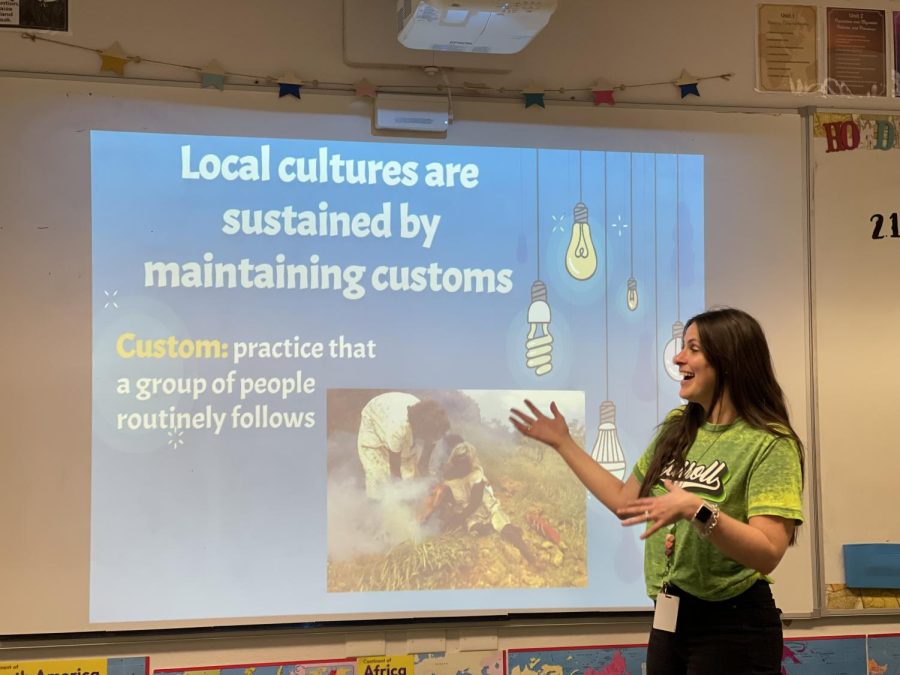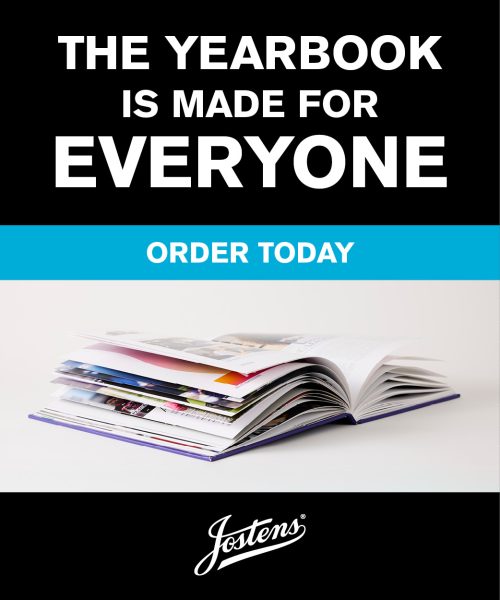Teacher Feature – Conversation with Brittany Razloznik
October 24, 2022
This interview is the first in our new series, featuring teachers on both the high school and senior high school campuses in a Q&A format. Brittany Razloznik is an AP Human Geography teacher at Carroll High School.
Q: What’s been your general experience in teaching at Carroll?
A: Well, I have awesome students. That’s my favorite thing. I’ve been lucky this year and last year. The engagement, the motivation has been so different here than the other schools I’ve been to and just the whole community feel of Southlake is very unique and I haven’t had that in the other places that I’ve been.
Q: What are the other places you’ve been?
A: I’ve taught in Plano, at Murphy Middle School. I’m from Plano, so I’m a graduate of Plano ISD. Then, I went to Fort Worth ISD, and then came here two years ago, and it’s been great.
Q: What are the classes you teach here?
A: This year, I’m only teaching AP Human Geography. Last year, I taught Advanced World Geography and AP Human, but this year we had so many students who wanted to take it, so we had enough classes that it’s all I teach, AP Human.
Q: Growing up, did you like more AP Human-type subjects?
A: So, I don’t think AP Human was offered in my high school so I didn’t take it or at least, I didn’t know about it, but I wish I did because it is such a cool class. You learn so much about so many different subjects and just the connectivity of it as well. Sometimes I’ll describe this class as a sociology class that ties back to geography. In college, I was a psychology major, so psychology and sociology have always been things that I have liked and had a lot of interest in, and then in this class, it kind of adds in that geography element to explain these patterns that we have around the world. It’s really fun to learn about with y’all, there’s always something that I’m learning too.
Q: So what was the path from psychology to AP Human teacher. Did you ever debate what to do or was this a set decision?
A: I actually had no idea I would become a teacher. I graduated college, I was a psych major and I minored in pre-law and business, so I thought I would go to law school. Things kind of changed when I ended up working an administrative job that I didn’t love and so I kind of had this epiphany one day along the lines of “I wish I could do something more with psychology, but incorporating it in my day-to-day,” and then it all just kind of came to me that I should be a teacher, I would love to be a teacher. In my head I was thinking AP, or just psychology in general. As I went through the process of becoming a teacher, I got my first teaching job and the best place for me to go was to middle school, because, well, seniors were too big and scary for my first year of teaching. So, I started teaching middle school and I taught seventh grade Texas History for those three years in Plano, and then when I went to Fort Worth, I did all of the middle school social studies. In my head, I was always thinking I’m going to get into psychology and teach that one day. So, even though now I’m not, I still do hope to teach psychology. However, now I really do love this class and it’s so fun to teach. There’s so many, again, connections to psychology with why things happen and why people do what they do.
Q: Are there ever times you like to apply what you’ve learned about psychology to kids in the classroom?
A: Oh, yes. I think that my psychology background has helped me so much as a teacher. It’s important to realize that, as mature as my freshmen want to act, their still kids and they are still trying to figure themselves out. Figure out the best processes, figure out how they fit in here in the school and in society. Definitely psychology helps me know how to be more empathetic and understanding of what they’re going through and to put myself in their position. Also, with everything with the pandemic and everyone has everything they’re going through at home and just in their lives, being able to understand any stressors or emotions or challenges people are going through. It’s so important to understand why things are happening. I worded that really wrong, but what I’m trying to say is that with behaviors in the classroom, being able to apply psychology and that knowledge helps give me a better way to approach situations. You know, is a kid acting out just to act out? Because there’s probably something going on behind that. It helps you really understand that.
Q: So psychology’s kind of helped you to form better connections with the students?
A: Exactly. There’s two other great things I’ve learned from psychology that I definitely apply now. One is motivation, like what motivates a student? Is it grades, is it because you want to do well, do you just want to fully understand the information? Figuring out, and helping kids figure out, their motivators to see them actually progress and meet their goals. My really, really favorite part is all of the classes that I took in memory and learning. We have a lot of assignments in this class, you’ve got to stay very organized, and being able to understand your best way to learn is something that I think can help tremendously. Being able to know how to study and learn effectively opposed to just going through the motions and then having to relearn that information and redo those assignments. Having the understanding of how your brain works just helps you learn better.
Q: Something I remember from your class last year is spending long hours in the beginning doing the unit assignments and annotating the Course and Exam Descriptions because I would always end up procrastinating and just hating the assignments. Then, at the end of the year, I realized how much it helped me to have this resource that I could look back on and have so much content in one place. How do you motivate kids to do these assignments since you know how much they benefit them while they don’t?
A: [The AP Exam] is so far away for them that they definitely don’t see the benefit yet. We’re definitely going through the learning curves right now. What’s been really cool this year is that we’ve kind of changed the structure of our class. We have something called a portfolio now that the students hold on to so on their quiz day, when last year that unit assignment would be due, they’re bringing that and all of the assignments they’ve done in that whole entire unit that they can use on that quiz. So, one, we try to motivate them with “Hey, if you put more effort into it now, you’ll do better on your quiz,” which will, in turn, help them do well on the unit test. But, giving them all of these assignments over the timespan of a month to turn in on one day, I have been stressing to them that they need to be chunking them and making sure they don’t try to do it all in one day or you’re going to get extremely overwhelmed. It’s been really fun to see. I just had a reflection that I had my kids do about Unit One and their Unit Two assignment and I saw a lot of them say “Chunking my unit assignment into small pieces makes it not that bad and it helps so much on the quiz.” They’re also understanding the unit better. So, it’s really cool to see since I know the first time around, it’s going to take a little practice, but I think they’re starting to understand and take that responsibility of how to manage their time. Generally, the best way to keep motivating them is to tell them that it’s hard right now but it will be worth it by the end and you will appreciate all of the work you’re doing now. Also the CED annotations, we’ve been working on those. I know you’ve had to do them in AP World. In that reflection, my kids were like “Can we not do CED Annotations anymore” and I just thought that they’re going to need that. They’re going to have a hard time without that skill. Without it, good luck in the rest of their AP classes because learning how to annotate those is just something you have to do.
Q: Do you prefer this new portfolio system over the deadline of having one or two things due every single class?
A: Overall, yes. I think I do like it better. It’s still hard to tell since it’s only the second time going through this. I guess I’ll say the negative about it is – well with y’all, you had deadlines. You had a lot every single day that you had a deadline for that kept you on pace. Now, the problem is that these kids have to be very self motivated to do the work and to get their stuff done. It’s putting the responsibility on them to manage their own time while it used to be me making something due every day. So, that part is harder for students who are not quite as organized and students who tend to procrastinate. It’s been a little bit of a struggle, but for the most part, there’s been an overall improvement from the last unit. The thing that I love about this system is the day after the quiz. The students bring in their portfolio and sit right [next to me] and we have a five minute conversation going through their portfolio, going through to see what assignments were done, what wasn’t done, if I have any questions on the specific assignment that I can ask them. More than just the grade or checking things off, it’s really nice to have a moment with the kids, one-on-one, and check in with them and what they’re thinking and how they’re doing.
Q: Kind of shifting gears to more general teacher life, what has been your favorite and least favorite part of being a teacher?
A: My students. My students are easily my favorite parts of teaching. One of my strengths – or at least, I hope one of my strengths – is connecting with my students. I really try to get to know every single student and get to know about them. It’s obviously hard with so many students, but I think it’s really important to form those relationships. It kind of shows in how many kids from last year will come by to talk and just say hi, before school, after school, and during passing periods. My students are kind of the root of why I teach. It’s fun to me. My other favorite part of being a teacher is that I like to learn. I like being in school – shocking, I know, from where we are right now. No matter what subject, I’m still learning whatever I’m teaching. My least favorite thing, honestly this will sound like a fake answer but it’s true, I don’t have one negative experience here. At least, in the last two years. COVID year, that was really hard. I don’t think anyone liked that. The workload that put on teachers was just crazy. I wasn’t here in Southlake yet, but the amount of expectations put on all teachers was a lot. We were 100% committed because that’s our job, we’re here to help. But, if kids aren’t motivated to even log on to the computer, that created challenges. Teachers still had that same expectation of having the same test scores and having the same pass rate. Going through that time period and then coming back and having to adapt was pretty hard. Also, I want to have a community feel in here, but behavior problems add to the challenge.
Q: Do you think that these problems are just new freshmen being freshmen or it stems from that year?
A: I think it’s kind of both. I think that there’s definitely an impact on maturity level. Last year, it was like your brains were smarter, but there were a lot of maturity things that I used to see with my seventh and eighth graders. Nothing super major, but some of the immaturity stuff. Sometimes, my students really lean into that excuse and kind of take advantage of it, so I’m still trying to get everyone back on track and more structured. Overall, though, it’s minor. Even with these complaints, it’s very minor.
Q: Thank you so much for taking the time to talk to me. Just to wrap up, is there anything else you want to add?
A: Just that, I really do love being here. Every experience I’ve had here has only been positive and I really love my students. Everyone here is so supportive. I wouldn’t want to be anywhere except here.


